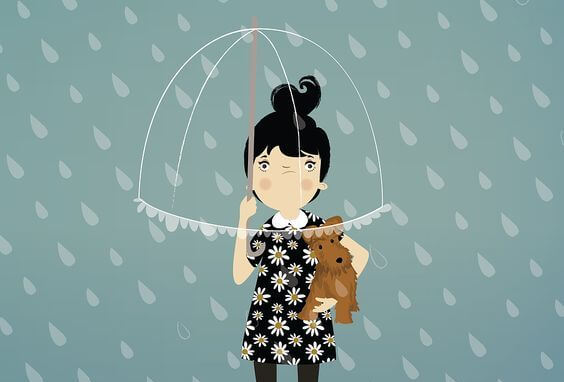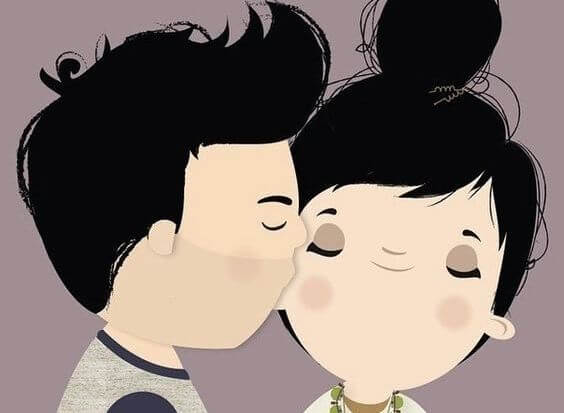Giving and Receiving Are Equally Important

Happiness is more than just the altruistic act of giving to someone for nothing in return. Everybody also has the right, and even the need, to receive. This encourages the heart and sets the foundation for reciprocity.
Mahatma Gandhi said that “the best way to find yourself is to lose yourself in the service of others.” This is a noble goal, but we shouldn’t confuse this idea of service with the functioning of personal or emotional relationships, where “giving and receiving” are part of the same circle, like the classic mythological ouroboros, which symbolizes eternal effort, where there is no beginning or end.
Giving a lot and receiving little is tiring, and even though the gift of knowledge in exchange for nothing is beautiful, you should also be able to receive without having to ask.
Adam Grant, psychologist and author of the book Give and Take, tells us that we all sit somewhere on the spectrum of those who are used to giving and those who only expect to receive. Harmony is found in the middle, where you can be happy both giving and receiving. Unfortunately, we don’t always see it this way.
This is especially true in romantic relationships.

The heart also desires recognition
We don’t want gifts; we prefer details. We don’t want others to return our favors or honor us with a plaque for all the effort we’ve invested, for all the time we’ve given, or for all the dreams we’ve helped them achieve by taking care of them and making them happy.
What the heart wants to receive is respect, recognition, and reciprocity. None of this is physically tangible, but it has the subtle virtue of touching the soul and making us feel loved. This is why, when we don’t have any of it, we often feel empty and helpless.
The problem in most romantic relationships originates in this dissonance: in giving everything in exchange for very little. Henry Miller, whose work is known for being full of life and sensuality, commented in one of his books that in these asymmetrical relationships, both partners are sick: one addicted to receiving, and the other addicted to giving.

Relationship dynamics
In all our relationships, whether they’re romantic, family, or friendships, we all lie at some point between the one who gives and the one who receives. It would be ideal if we all assumed the role of “balancer” and tried to achieve a respectful harmony between what we contribute and what we gain, depending on the specifics of the interaction.
Let’s look in detail at the types of dynamics that tend to occur according to the theories of the author of Give and Take.
- Givers: This is the profile that the psychologist defined as the “Wendy syndrome.” These people feel that happiness is giving everything to others without receiving anything in return.
- Takers: Here we find people who are used to only receiving.
- Matchers: What we mentioned earlier. They seek harmony and mutual benefit.
- False Givers: We’re sure that you’ve encountered this type of behavior before. These people hide behind masks and are very deceitful. They appear to be super generous, but their strategy is keen and selfish: they’ll do you a favor and then, like Shylock, the classic character from The Merchant of Venice, will demand a piece of your heart.

You have to know what you deserve
It’s clear that the world is a complex and diverse setting, full of happiness and misery, where good intentions and bad intentions are just another part of the day. However, you can’t do anything to change your partner or family member who expects more than they’re prepared to offer.
With the goal of maintaining healthy relationships, you should be aware that seeking blame will only cause more suffering. Some relationships are unsustainable even if there is love, and this is usually because one of the two doesn’t love the other person they way they want, expect, or need them to. There’s no need to blame anyone.
We just have to remember that, first and foremost, we all need to establish a fair relationship with ourselves and take care of our self-esteem. Remember that love is not a game where only one person wins.
True love, love that comes from the soul, happens when two wise people offer themselves freely to the each other, and build and invest in the relationship equally. Love is wanting the other person to be happy without demanding your own happiness as payment.
Happiness is more than just the altruistic act of giving to someone for nothing in return. Everybody also has the right, and even the need, to receive. This encourages the heart and sets the foundation for reciprocity.
Mahatma Gandhi said that “the best way to find yourself is to lose yourself in the service of others.” This is a noble goal, but we shouldn’t confuse this idea of service with the functioning of personal or emotional relationships, where “giving and receiving” are part of the same circle, like the classic mythological ouroboros, which symbolizes eternal effort, where there is no beginning or end.
Giving a lot and receiving little is tiring, and even though the gift of knowledge in exchange for nothing is beautiful, you should also be able to receive without having to ask.
Adam Grant, psychologist and author of the book Give and Take, tells us that we all sit somewhere on the spectrum of those who are used to giving and those who only expect to receive. Harmony is found in the middle, where you can be happy both giving and receiving. Unfortunately, we don’t always see it this way.
This is especially true in romantic relationships.

The heart also desires recognition
We don’t want gifts; we prefer details. We don’t want others to return our favors or honor us with a plaque for all the effort we’ve invested, for all the time we’ve given, or for all the dreams we’ve helped them achieve by taking care of them and making them happy.
What the heart wants to receive is respect, recognition, and reciprocity. None of this is physically tangible, but it has the subtle virtue of touching the soul and making us feel loved. This is why, when we don’t have any of it, we often feel empty and helpless.
The problem in most romantic relationships originates in this dissonance: in giving everything in exchange for very little. Henry Miller, whose work is known for being full of life and sensuality, commented in one of his books that in these asymmetrical relationships, both partners are sick: one addicted to receiving, and the other addicted to giving.

Relationship dynamics
In all our relationships, whether they’re romantic, family, or friendships, we all lie at some point between the one who gives and the one who receives. It would be ideal if we all assumed the role of “balancer” and tried to achieve a respectful harmony between what we contribute and what we gain, depending on the specifics of the interaction.
Let’s look in detail at the types of dynamics that tend to occur according to the theories of the author of Give and Take.
- Givers: This is the profile that the psychologist defined as the “Wendy syndrome.” These people feel that happiness is giving everything to others without receiving anything in return.
- Takers: Here we find people who are used to only receiving.
- Matchers: What we mentioned earlier. They seek harmony and mutual benefit.
- False Givers: We’re sure that you’ve encountered this type of behavior before. These people hide behind masks and are very deceitful. They appear to be super generous, but their strategy is keen and selfish: they’ll do you a favor and then, like Shylock, the classic character from The Merchant of Venice, will demand a piece of your heart.

You have to know what you deserve
It’s clear that the world is a complex and diverse setting, full of happiness and misery, where good intentions and bad intentions are just another part of the day. However, you can’t do anything to change your partner or family member who expects more than they’re prepared to offer.
With the goal of maintaining healthy relationships, you should be aware that seeking blame will only cause more suffering. Some relationships are unsustainable even if there is love, and this is usually because one of the two doesn’t love the other person they way they want, expect, or need them to. There’s no need to blame anyone.
We just have to remember that, first and foremost, we all need to establish a fair relationship with ourselves and take care of our self-esteem. Remember that love is not a game where only one person wins.
True love, love that comes from the soul, happens when two wise people offer themselves freely to the each other, and build and invest in the relationship equally. Love is wanting the other person to be happy without demanding your own happiness as payment.
This text is provided for informational purposes only and does not replace consultation with a professional. If in doubt, consult your specialist.







